 Probiotics: Benefits, Categories, and Protocols
Probiotics: Benefits, Categories, and Protocols
Probiotics are one of the most important things to consider when looking to improve your health. Our bodies are home to trillions of microorganisms, outnumbering our cells ten to one. This large and complex community is referred to as the gut flora or microbiota and has many critical functions in the body. Proper diversity and balance of our gut flora are essential to a healthy body and healthy aging.
There is an increasing amount of evidence linking many health issues to disturbed gut microbiota. With this evidence, many people are turning to probiotics to maintain and improve the balance of their gut flora.
Probiotics are friendly live microorganisms that are similar to the beneficial microorganisms found in your gut. They help to colonize your gut with health-boosting bacteria and yeast to ensure that you have the right balance of microorganisms.
Probiotics have been shown to have many positive effects on the body including immunomodulation, protection from infections, improving digestive conditions, increasing nutrient absorption, helping with weight loss, and improving brain health. In this article, you will discover how to best use probiotics to improve your health.
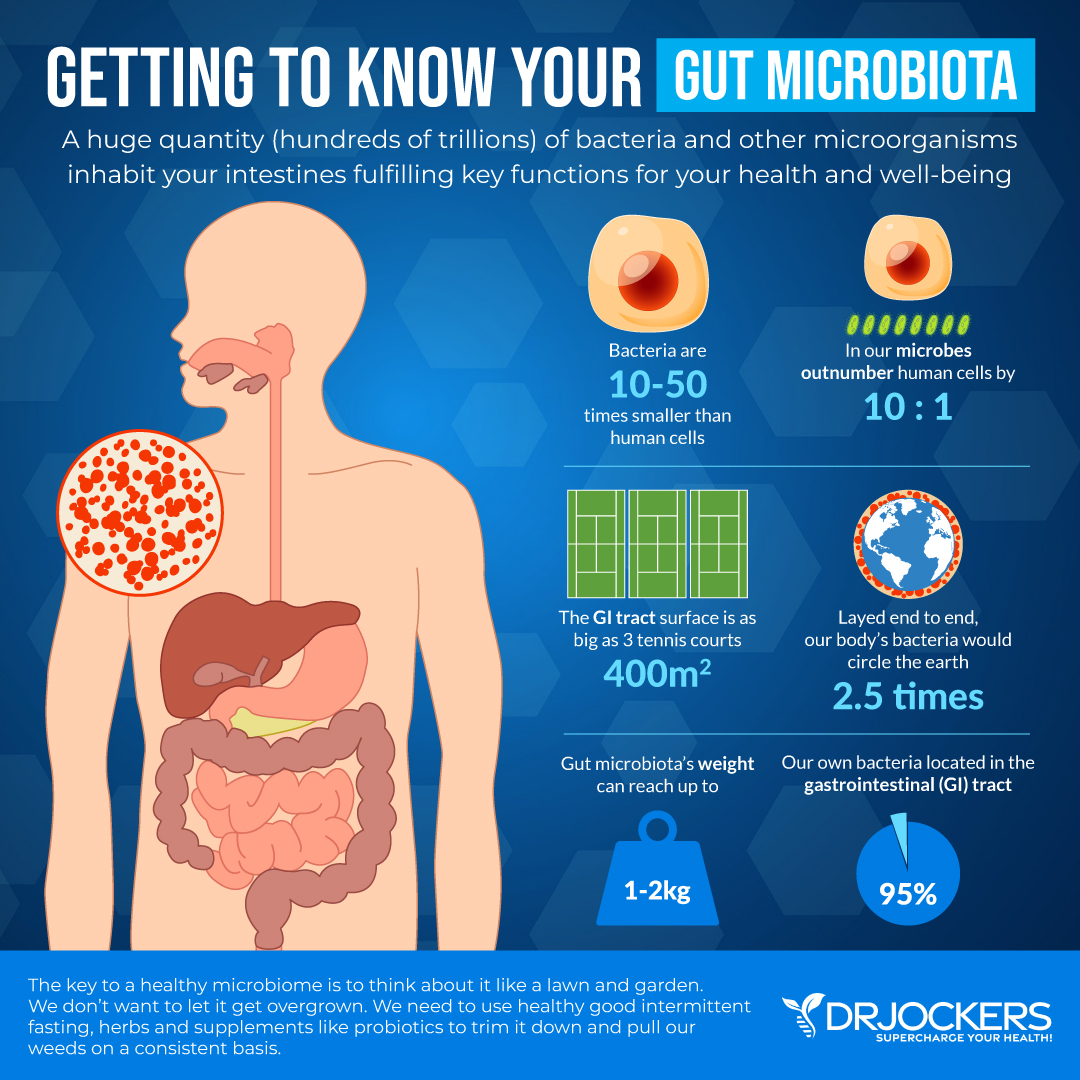
How the Gut Microbiome Affects your Health
The health of your body and mind are dependent upon a balanced, healthy microbiome. The gut microbiome is made up of trillions of microbes, ten times more than the number of human cells. The human microbiome is also genetically diverse, expressing approximately 150-times more genes than the human host (1).
The ideal ratio of beneficial to pathogenic microbes is around 85:15. Unfortunately, most people have an inverse ratio with bad bacteria outnumbering the good bacteria. This imbalance in the gut flora is called dysbiosis.
When there is an overgrowth of bad bacteria, the gut lining becomes more permeable. This allows toxins to enter the bloodstream where they can travel around the body with various negative effects. As a result, dysbiosis can cause serious health consequences.
Imbalances in the gut flora are linked to a number of diseases including obesity, Crohn’s disease, IBS, and colorectal cancer (1). Strategies to improve the gut microbiota may reduce chronic inflammation and promote healthy aging (2). Taking probiotics is an incredible strategy to balance your gut flora.
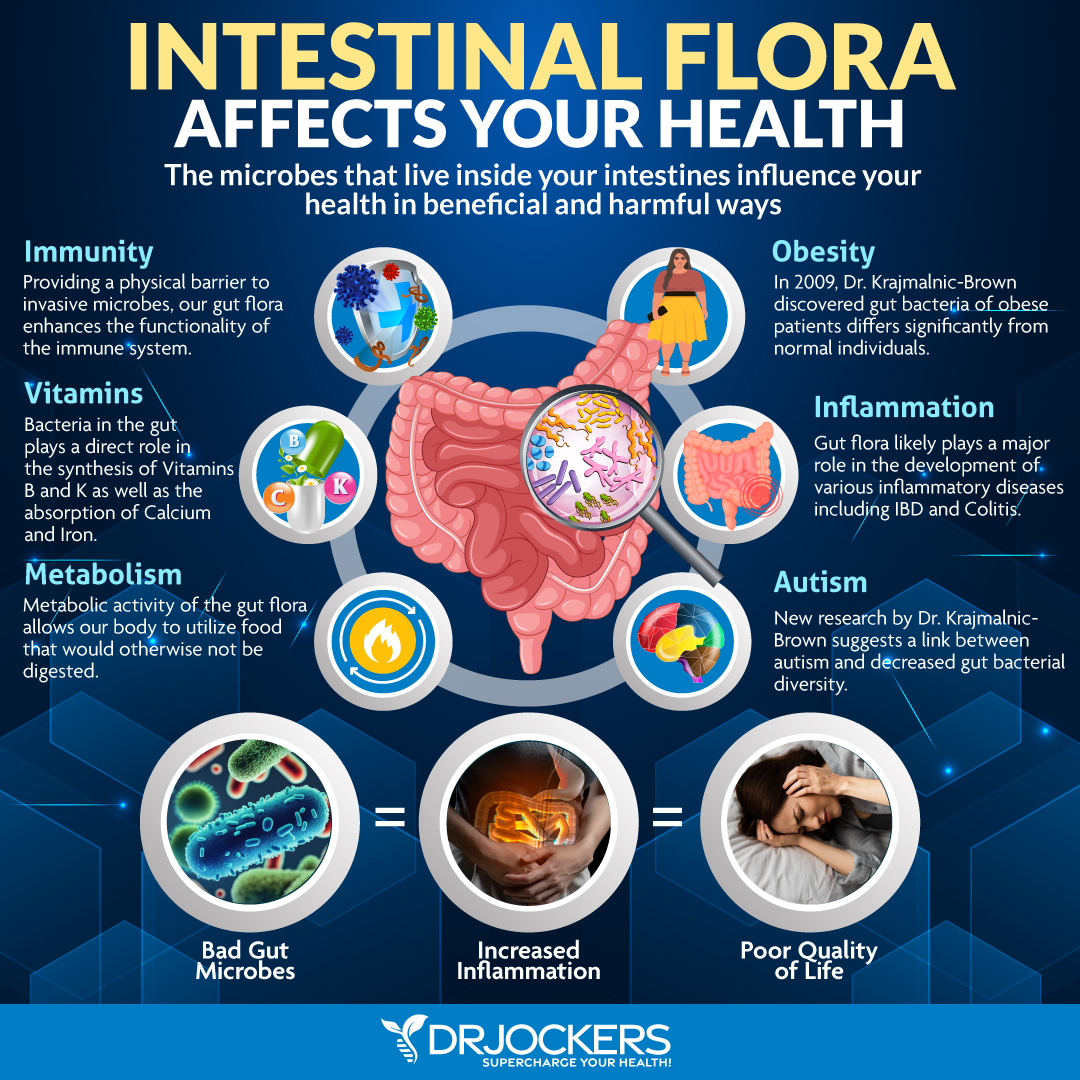
What are Probiotics?
Probiotics are beneficial microorganisms (bacteria, parasites and fungal yeasts) that keep your gut and body healthy. They are similar to the microorganisms that naturally live in our bodies.
The term “probiotics” means “for life.” The concept was first introduced by Elie Metchnikoff, the “father of probiotics,” in the early 20th century. Metchnikoff studied centenarians in Bulgaria and found a common link between the consumption of probiotics and improved health and longevity.
There are many different probiotics available. They differ by type of probiotic, strains contained in the probiotic, and number of CFUs. CFUs are “colony forming units”. This indicates how many bacteria in the probiotics are capable of dividing and forming colonies. In other words, CFUs are the number of live bacteria in a finished product.
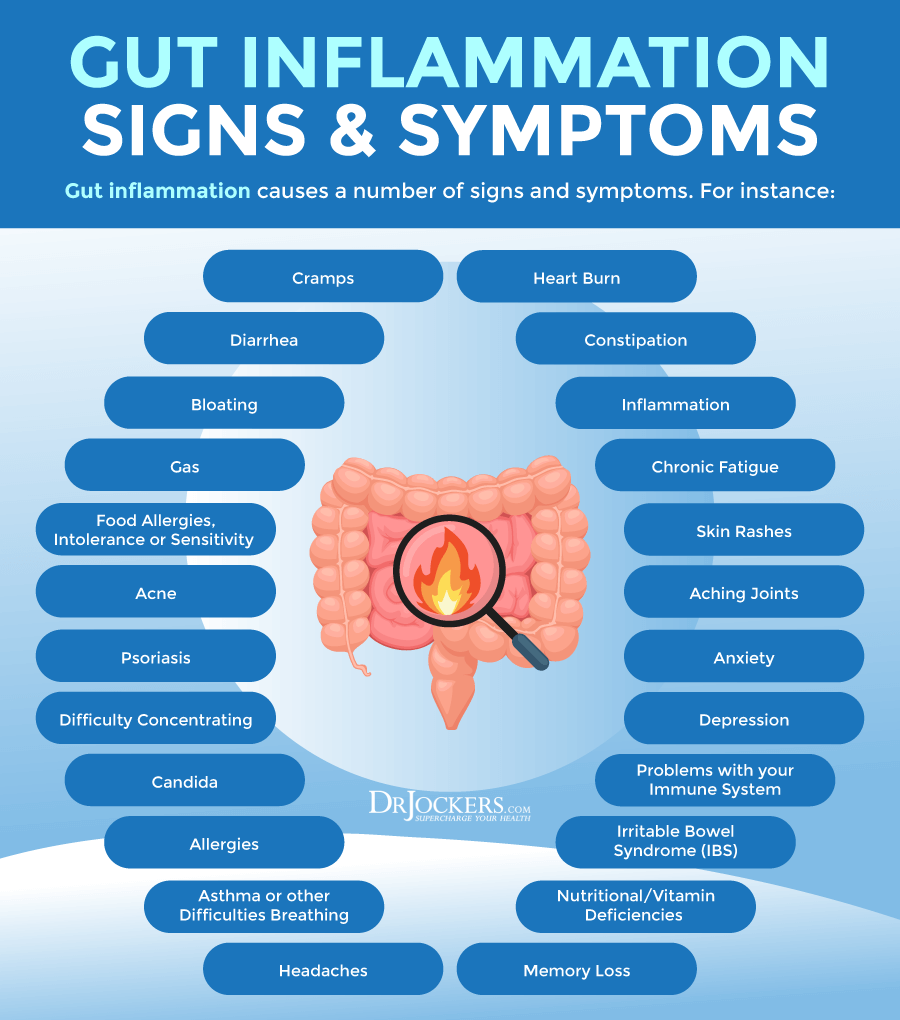
Benefits of Probiotics
Probiotics have been well studied for their health benefits. While gastrointestinal diseases have been the traditional focus of research, the scope has been broadened in recent years to include virtually every organ system in the body.
Some of the many benefits of probiotics include boosting immune health, protecting against infections, reducing inflammation, improving gastrointestinal diseases, increasing nutrient absorption, and managing weight.
There is also an important link between the gut microbiota and brain health. Probiotics may help improve brain function, reduce symptoms of depression and anxiety, and combat stress.
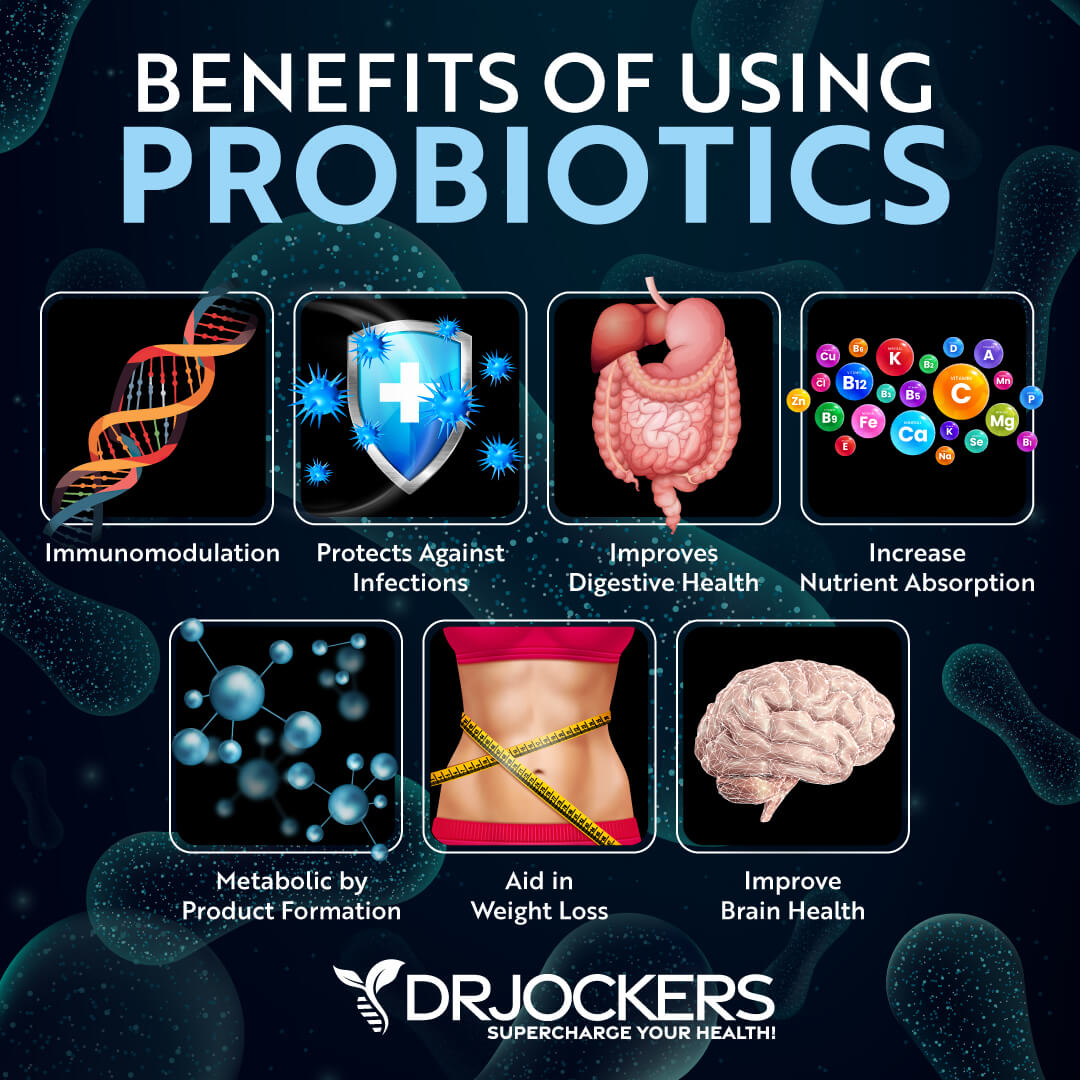
1. Immunomodulation
The gut microbiota is critical in the development of both the intestinal mucosal and systemic immune systems (3). Some species of probiotics are immunoregulatory due to their ability to induce IL-10 and regulatory T cell pathways.
Probiotics have been shown to reinforce intestinal barrier function and reduce inflammation. They stimulate the production of anti-inflammatory cytokines and moderate white blood cell action.
2. Protection Against Infections
Probiotics help to inhibit the growth of pathogenic microbes by maintaining microbial homeostasis. They protect the body from infections by several different mechanisms:
- Probiotics act as a physical barrier to incoming pathogens by lining the digestive tract;
- Probiotics enhance mucous production to protect against invasive bacteria;
- Probiotics stimulate the production of antimicrobial compounds – they cause the mucosal immune system to secrete protective immunoglobulins such as secretory IgA and protective defensins and bacteriocins into the lumen; and,
- Probiotics make the mucosal immune system more anti-inflammatory (4).
Certain probiotics can deconjugate and dehydrate primary bile acids to convert them into secondary bile acids. Secondary bile acids can inhibit Clostridium difficile (C. diff) spore germination and suppress the growth of this bacterial infection (1).
Probiotics have also been shown to be useful in controlling Helicobacter pylori (H Pylori) infections (5). H Pylori can cause gastroduodenal ulcers and is a substantial risk factor for gastric malignancies. To learn more about the damaging effects of H Pylori infection, check out this article.
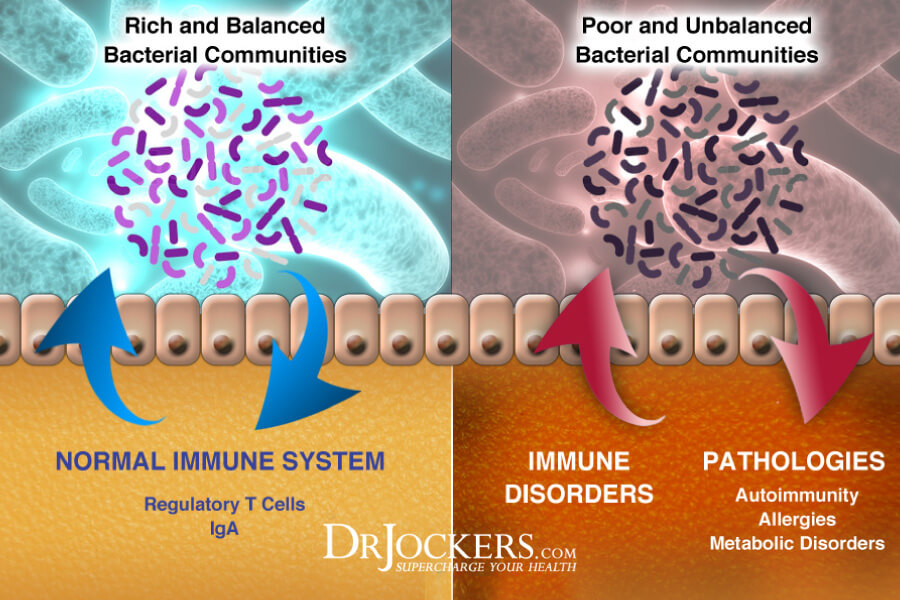
3. Improves Digestive Health
Probiotics have been extensively studied and shown to improve digestive health. Irritable bowel syndrome is one of the most common functional gastroenterological diseases, affecting around 12% of people worldwide.
Probiotics have been shown to be an effective therapy in IBS patients. For individuals struggling with constipation, they help to improve bowel frequency and quality. For individuals struggling with diarrhea, they help to reduce bowel frequency and improve the consistency of the bowel (6).
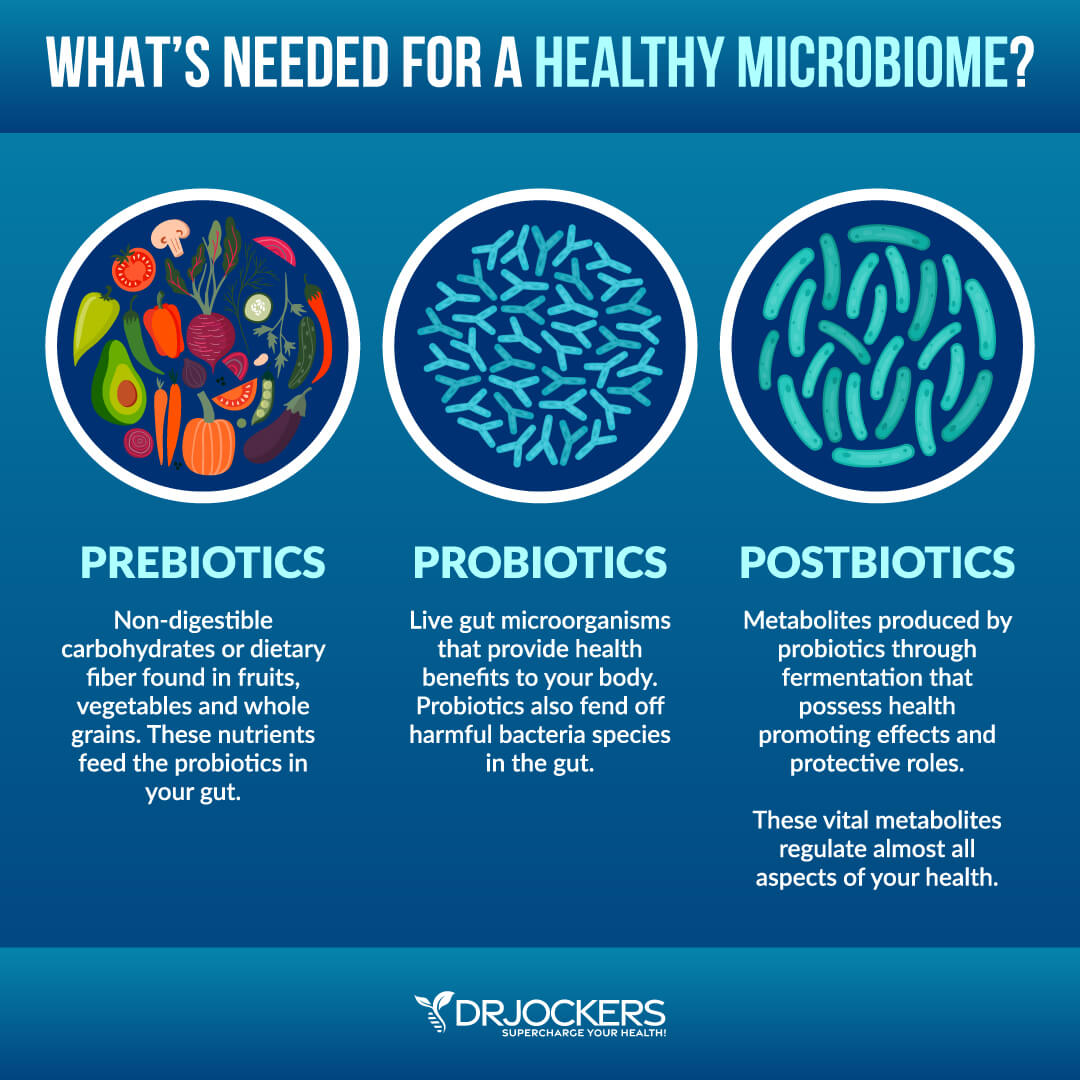
4. Increase Nutrient Absorption and Metabolite By-Products
Bacteria in the gut plays a direct role in the bioavailability of vitamins and minerals. Gut bacteria supply essential nutrients and aid in the absorption of minerals like calcium and iron. Vitamin B12, vitamin K, pyridoxine, biotin, folate, nicotinic acid, and thiamine can all be products by microorganisms in the gut (1).
The metabolic activity of our gut flora allows our bodies to utilize foods that would otherwise be undigested. Probiotics and prebiotics produce certain metabolite by-products such as short-chain fatty acids (SCFAs). SCFAs are a major player in the maintenance of gut and immune homeostasis, including the regulation of metabolism, inflammation, and disease processes (7).
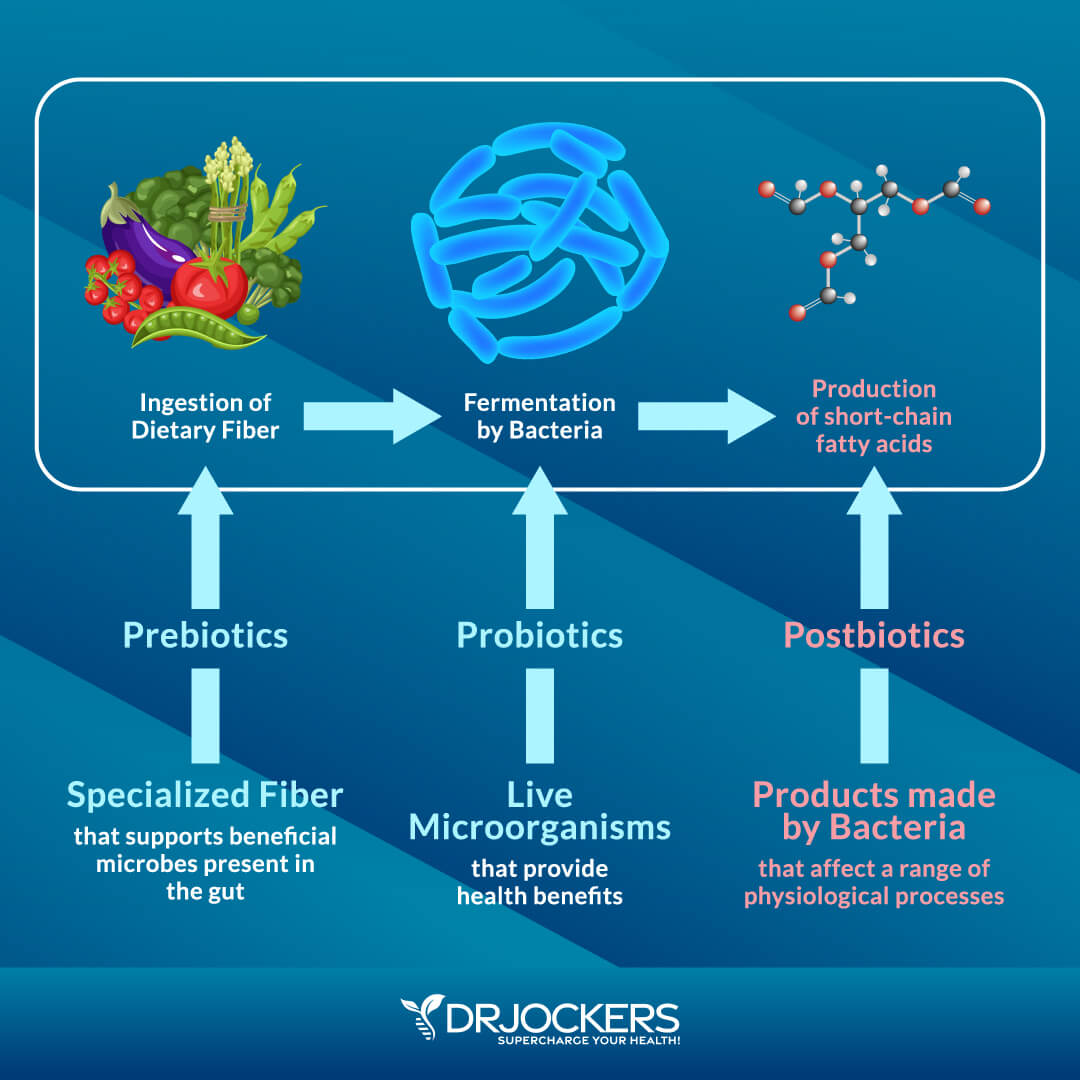
5. Aid Weight Loss
Probiotics may help rid excess weight. Obese people have significant differences in gut bacteria from normal-weight individuals. In a recent review, probiotics were found to result in a significantly larger reduction in body weight and BMI compared with placebo (1).
Probiotics, along with a healthy diet and lifestyle, may be an effective strategy for managing obesity and its related metabolic diseases.
6. Improve Brain Health
The relationship between the gut and the brain is a rapidly evolving field of research. The “gut-brain axis” refers to the bidirectional communication system that exists between the gastrointestinal tract and the central nervous system.
Additionally, the gut is considered the “second brain” due to the amount of nerve endings and neurotransmitters that are linked to gut function. When the gut lining is inflamed and damaged, large proteins enter the bloodstream. This creates inflammation in all tissues, including the brain. Individuals with leaky gut have an increased risk for brain fog, depression, irritability, and other cognitive issues.
Research has shown that probiotics can alter the gut microbiota to significantly improve symptoms of anxiety and depression, prevent increases in stress hormones, and reduce migraines (1). Introducing the right type of probiotic strains daily may be a powerful way to improve your brain health.
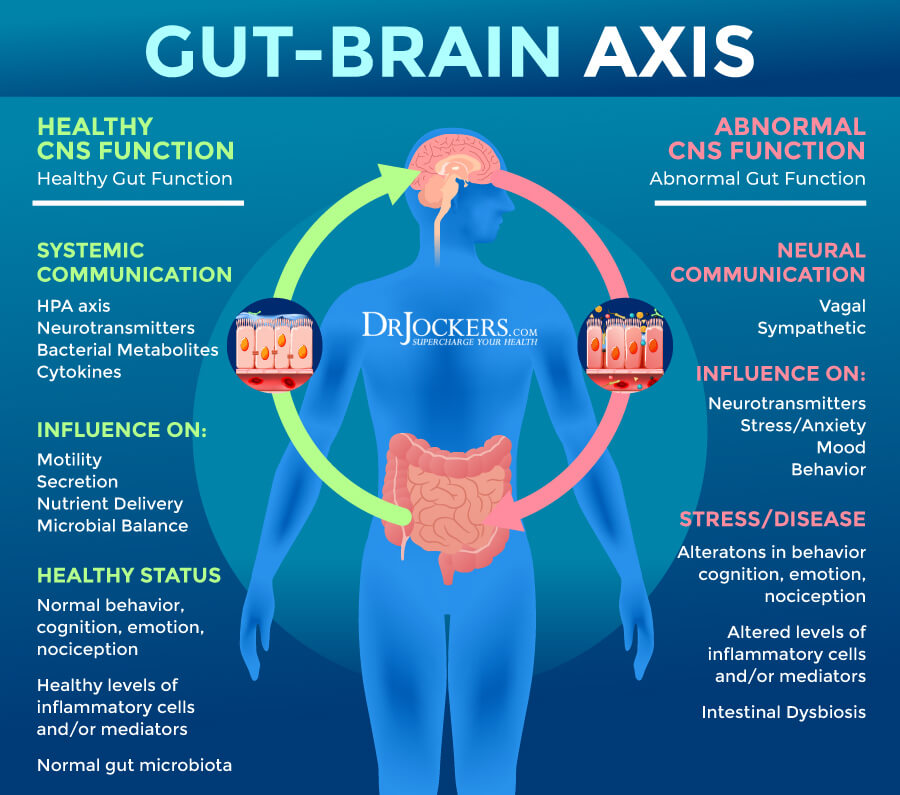
Categories of Probiotics
Probiotics may contain a variety of microorganisms. There are 4 main categories of probiotics: Food Based, Soil Based, Beneficial Yeast and Combination Probiotics. For anyone with digestive challenges, a good strategy is to try one probiotic from each category for a short time to determine which is most beneficial.
If you have a lot of food sensitivities and have experienced weird reactions to supplements in the past, then it is advisable to begin low and slow with probiotics. Try one category and the lowest dosage (1 capsule or even 1/2 capsule) to make sure you are tolerating it without unwanted symptoms and then gradually move up to the standard dosage each day.

1. Food-Based Probiotics
Lactobacillus and Bifidobacterium are types of food-based probiotics. These probiotics are commonly referred to as “lactic acid-producing bacteria” and have been studied extensively for the treatment of various health conditions. Lactobacillus and Bifidobacterium can be further classified into subspecies, variants, and strains.
ProbioCharge is an ideal combination of food-based probiotics to support your gut flora, cellular health, and immunity. It comes in either 100 billion or 30 billion CFUs per capsule options. Probiocharge contains four well researched probiotic strains, including two Lactobacillus strains and two Bifidobacterium strains.
Lactobacillus Strains
Lactobacillus acidophilus La-14 is a common inhabitant of the human mouth, intestinal tract, urinary tract, and vagina. It is found in some traditional fermented milk (e.g., kefir) and is widely used in probiotic foods and supplements. L acidophilus has excellent adhesion to the gut lining.
Lactobacillus plantarum Lp-115 is a bacterium isolated from plant material and is abundantly present in lactic acid-fermented foods, such as olives and sauerkraut. In vitro studies have shown that L plantarum strain Lp-115 has excellent adhesion to epithelial cell lines. In addition, L plantarum is resistant to low pH conditions and survives the presence of bile at duodenal concentrations.
Bifidobacterium Strains
Bifidobacterium lactis HN019 was discovered in 1899 and plays a key role in the human microflora throughout a person’s life. Researchers have identified strain HN019 as having excellent probiotic potential based on its ability to survive the transit through the human gastrointestinal tract, adhere to epithelial cells, and proliferate.
The Bifidobacterium longum B1-05 strain is well-accepted as safe for human consumption. B longum is resistant to low pH and bile salts and is well-suited to the intestinal environment.
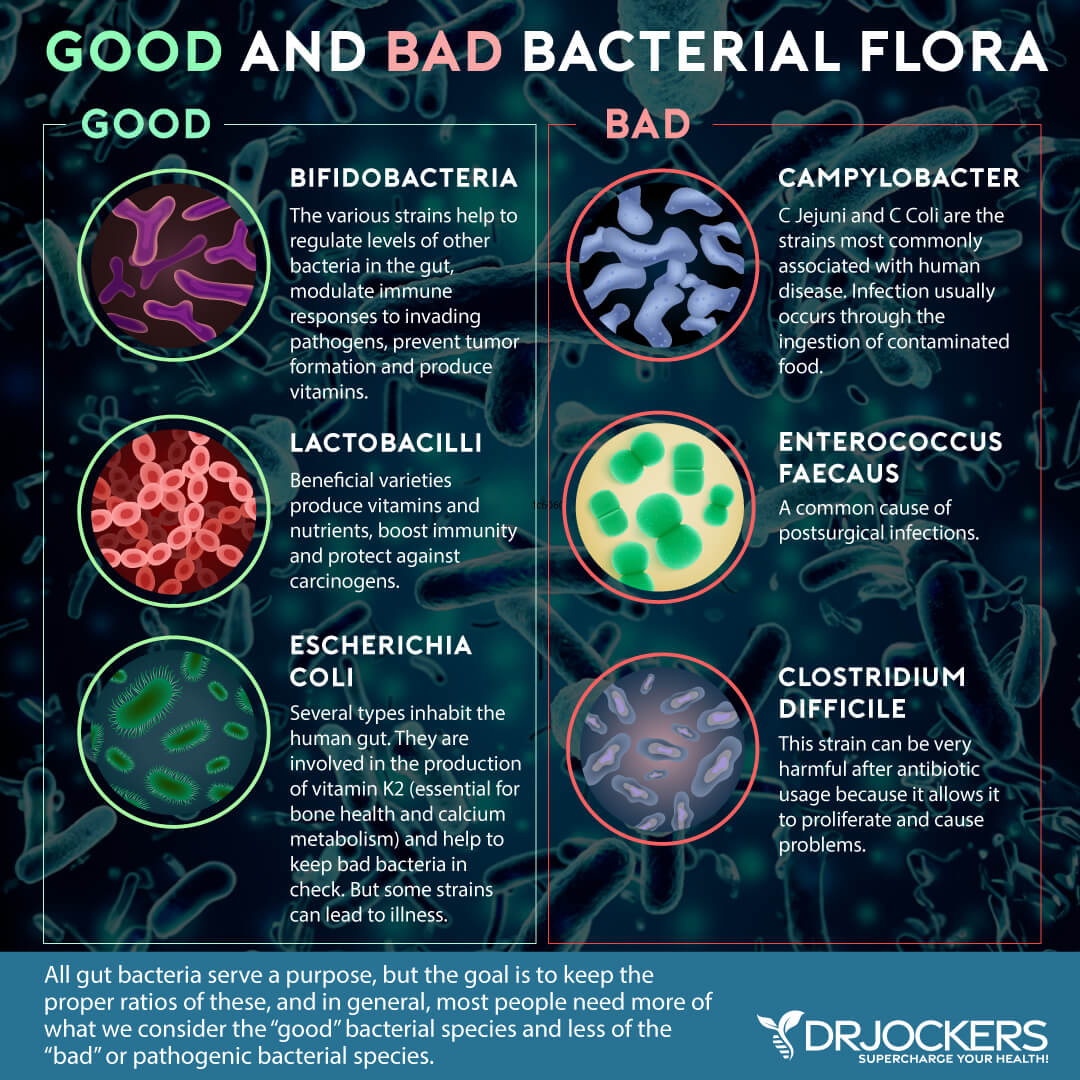
2. Probiotic Yeasts
Saccharomyces boulardii is a natural, non-pathogenic probiotic yeast. One of the main benefits of Saccharomyces boulardii is that it is resistant to stomach acids and antibiotics. It promotes immune and digestive health.
There are many benefits to Saccharomyces boulardii. It improves gut motility to reduce constipation and supports bowel fluid balance to reduce diarrhea (8). Saccharomyces boulardii also reduces gut inflammation and intestinal pathogens while improving gut-mediated immunity (secretory IgA levels) and cytokine balance. It may also have a role in the production of short-chain fatty acids, including butyrate.
S-Biotic Flora is a lactose-free, European patent-pending formula containing DNA verified Saccharomyces boulardii. It provides 10 billion colony-forming units of S boulardii in a two-capsule dose. This formula is stable and resistant to stomach acid.
If you are taking a round of antibiotics, you should ALWAYS supplement with a Saccharomyces boulardii probiotic to prevent antibiotic resistant bacterial overgrowth, C diff infections, or pathogenic yeast overgrowth.

3. Soil-Based, Spore-Forming Probiotics
Soil-based probiotics have the ability to form bacterial spores. Spore probiotics are used in clinical settings to treat gastrointestinal disorders (9). Spore-based strains have an innate resistance to the stressors of heat, light, stomach acid, and time. This ensures long-term viability and protects them against degradation so that they reach the lower GI tract intact and alive.
Spore-forming probiotics are a promising alternative for people affected by recurring gut problems. In fact, treatment of small intestinal bacterial overgrowth (SIBO) with spore probiotics was found to have the same effects as antibiotics (10). Bacillus-based probiotics reinforce intestinal barrier integrity and reduce inflammation in the gut (11).

Top 3 Soil Based Probiotic Brands
MegaSporeBiotic™ contains a unique blend of 5 Bacillus spores designed to protect its human host. This broad-spectrum spore forming probiotic is shown to recondition the gut and withstand the acidic environment of the gastric system (12).
MegaSporeBiotic is good for very sensitive individuals who struggle with food sensitivities, poor oxalate metabolism, and histamine intolerance. People who have not responded well to other probiotics may do well with MegaSporeBiotic.
4. Combination Probiotics
Combination probiotics blend different types of probiotics into one formula. An example is Ultimate Probiotic, which combines the food-based lactobacillus and bifidobacterium probiotics, the soil-based, spore forming probiotics Bacillus subtilis and Bacillus coagulans, and the beneficial yeast, Saccharomyces boulardii into one capsule. The total CFUs of this probiotic blend is 100 billion.
The Ultimate Probiotic also contains organic prebiotics which feed and supports the strength of the probiotics in each capsule. This probiotic supports healthy immune system function, healthy gut function, and a healthy gastrointestinal tract.
Which Probiotic Is Best for You?
For most people, taking a combination of probiotics for general wellness is a great idea. However, if you have digestive health symptoms or other significant health complaints then it would be wise to try them one at a time to see which one makes the biggest difference for you.
Your trial run on the probiotic type should only need to last about 7 days. The first few days, the microbiome may need to adjust to the new probiotic strains, and this could cause some unwanted symptoms but that should not last more than 3 days. By 7 days, you should see improvements if the probiotic you are testing is right for you.
If you are a highly sensitive individual, I would recommend starting with a soil-based formula as those tend to be the most well-tolerated. They are also the most expensive, unfortunately. If you feel better after the 7-day trial then that is a sign that this particular probiotic is benefiting you and if you feel worse then it is not.
Once you find the probiotics that are working well for you, it is a good idea to cycle probiotics every 1-3 months or so. This helps to keep the microbiome adapting and diversifying which is beneficial. If you are only responding well to one type of probiotic then stay on that and don’t worry about rotating. However, if you respond well to all 3 types of probiotics then rotating between them or between combination probiotics can be very helpful.
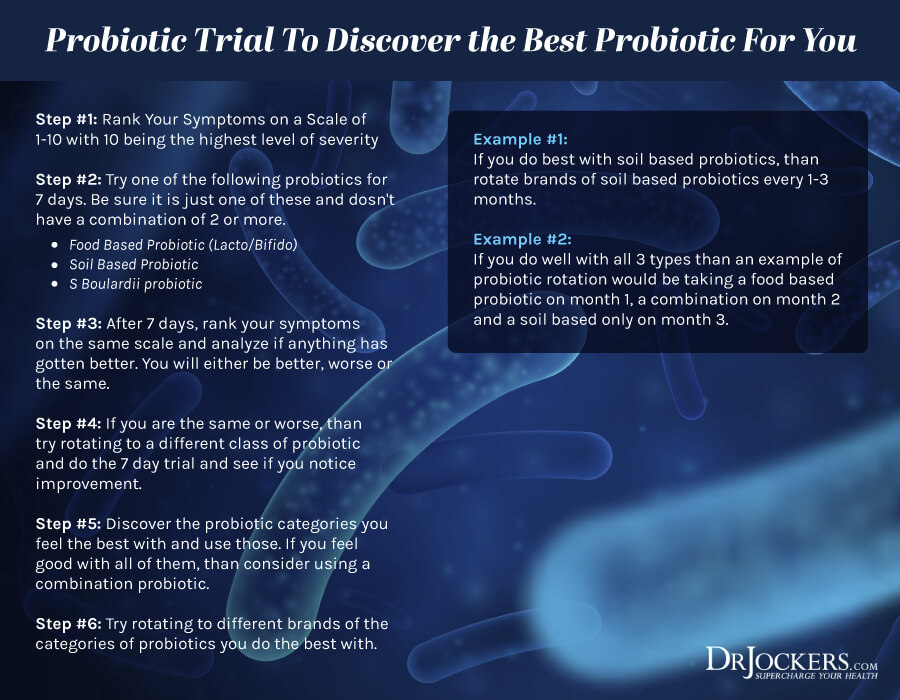
Ways to Improve Gut Flora
A poor diet, toxins, stress, and certain medications can create imbalances in your gut flora. In addition to using probiotics, it is important to address these factors to improve your gut microbiome. You can find a detailed article on 10 ways to improve your gut microbiome here. Let’s look at a few of the ways to improve your gut microbiome.
1. Anti-Inflammatory, Gut-Healing Diet
Diet has a profound impact on your gut flora. An anti-inflammatory, healing diet removes foods that cause inflammation and disrupt the microbiota and includes organic, non-GMO vegetables, fruits, healthy fats, and clean protein. A healing diet reduces inflammation, stabilizes blood sugar, reduces toxic load, provides necessary nutrients, and supports healthy blood pH levels.
Food to Avoid
For a healthy gut microbiome, it is critical to avoid pro-inflammatory foods. Refined sugars and grains, and any foods that are easily metabolized into sugar are highly inflammatory. They create extra acidity in the tissues and lead to imbalances in your gut flora.
Meat and dairy from conventionally-raised animals, farmed fish, non-organic fruits and vegetables, and highly processed vegetable oils, such as canola, grapeseed, and safflower, promote inflammation and should be eliminated. The toxins in these foods can worsen gut health and destroy good bacteria (1).
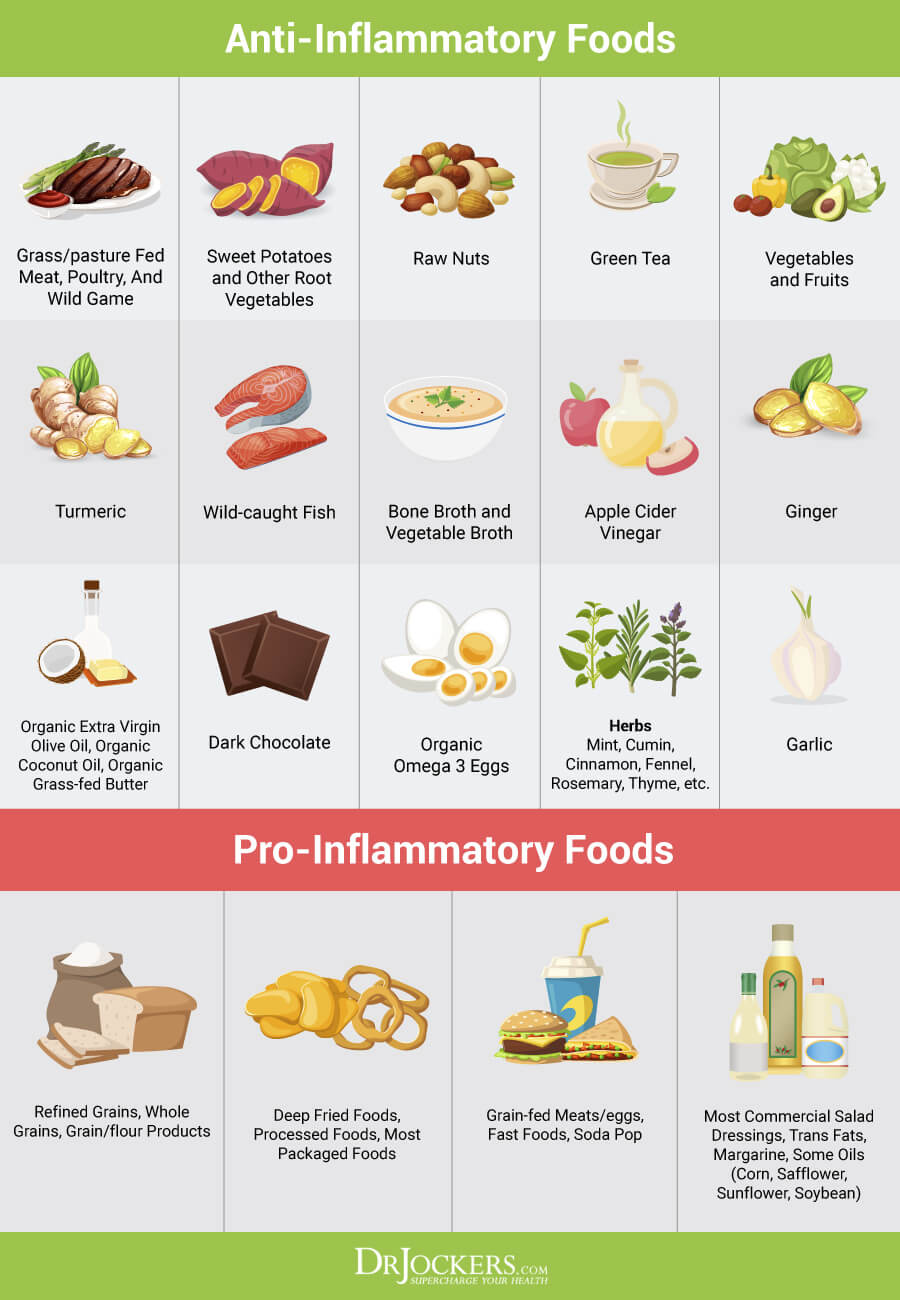
Foods to Include
The foods you should be eating on an anti-inflammatory, gut healing diet are whole, unprocessed foods. Choose grass-fed, pasture-raised, wild-caught meats and fish. Enjoy a variety of lower carbohydrate, low glycemic, colorful vegetables and fruits for their abundant antioxidants and phytonutrients. Plentiful amounts of herbs are also wonderful to use on a healing diet.
Fruits and vegetables contain fiber which helps good bacteria in the gut to thrive. Fiber is a prebiotic because beneficial gut bacteria feed on fibrous foods. The top prebiotic foods include berries, sweet potatoes, carrots, cucumbers, and seeds such as flax, hemp, pumpkin, and chia seeds.
Fermented foods are functional foods with health benefits. The process of microbial fermentation converts food substrates into more nutritionally and functionally rich products, resulting in probiotics, prebiotics, and bioactive components. These functional ingredients act together in the gastrointestinal tract to modify the gut microbiota, remove toxins, activate the immune system, and promote the absorption of nutrients (13).
Great sources of healthy fats are coconuts, olives, avocados, and their oils and grass-fed butter and ghee. Butter and ghee are fantastic sources of butyrate, a short-chain fatty acids. Butyrate is synthesized by your gut bacteria when breaking down prebiotic fibers. It plays a central role in gut health and promotes a healthy gut microbiota.
Omega-3 fatty acids and conjugated linoleic acid (CLA) found in wild caught salmon and grass-fed beef and dairy have many health benefits. These healthy fats are an efficient source of fuel for the body to combat inflammation and support and healthy gut.
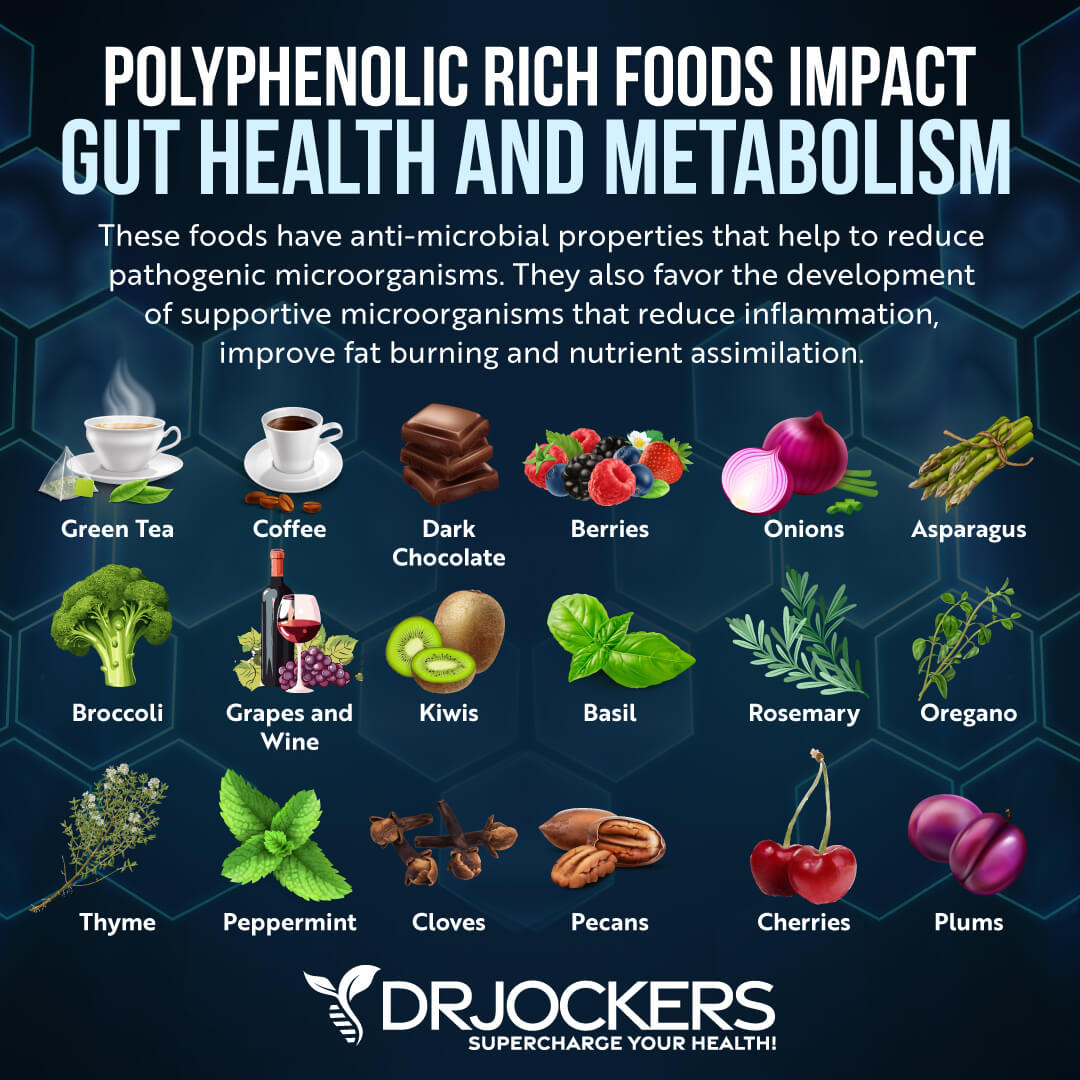
2. Limit Antibiotics, Aspirin and NSAIDS
The overuse of antibiotics, aspirin, and non-steroidal anti-inflammatory drugs (NSAIDS) can cause imbalances in your gut microbiota.
NSAIDS are among the most widely used medications. These drugs have been shown to cause bleeding, inflammation, and ulceration in the stomach and small intestine (14).
Antibiotics kill good bacteria in addition to the bad bacteria. This impact can be long-term and can lead to antibiotic-resistant pathogenic strains (15).

3. Support Good Elimination
Daily bowel movements are very important for a healthy gut flora. When you are not eliminating daily, waste sits or moves slowly through your digestive tract. This waste will putrefy, create harmful toxins, and be fermented by bacteria.
Stagnant waste is a breeding ground for bad microbes which release inflammatory toxins throughout the body. Two fantastic supplements for natural, gentle relief from constipation are Bowel Mover and Oxy-Powder.
Bowel Mover has a propriety blend of aloe leaf, cascara Sagrada bar, rhubarb root, barberry root, ginger root, black walnut hulls, senna leaf, wormwood, garlic bulb, clove bud, fennel seed, extracts of fulvic acid, and cayenne pepper. It is specifically designed to promote digestive and detoxification support without causing cramping or dependency.
Oxy-Powder is a scientifically formulated, all-natural oxygen colon cleanser. It safely relieves the bloating, irritation, and constipation associated with a toxic colon. Oxy-Powder promotes intestinal harmony while creating an environment that encourages friendly probiotic growth.
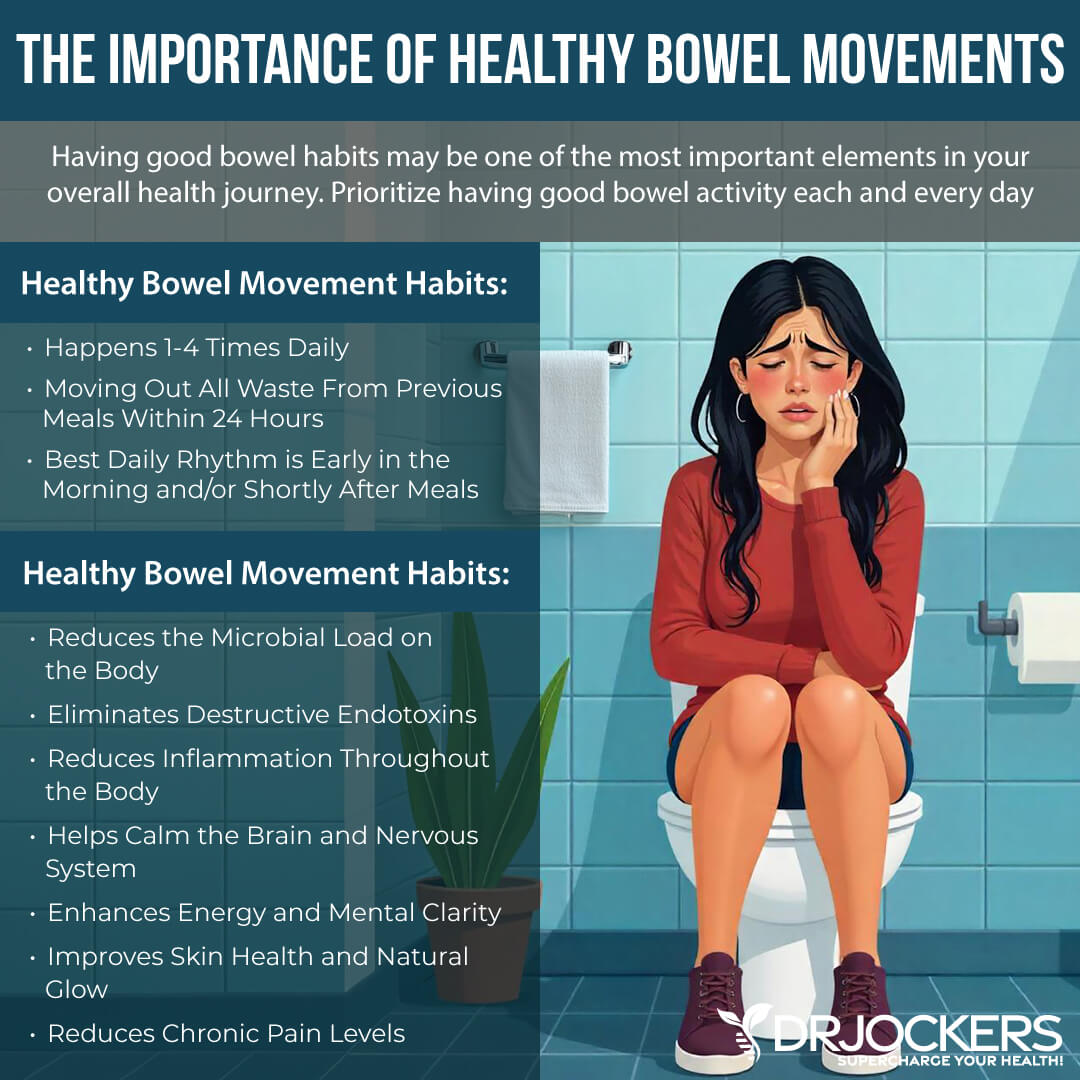
Testing for Bacterial Imbalances
Stool testing is a valuable resource for determining the status of your gut microbiota and overall gut health. The GI Map and Digestive Health Panel are important tests which should be done routinely to monitor your gut microbiome.
1. GI-MAP™ DNA Stool Analysis
The GI-MAP Stool Analysis Test is the most thorough stool test on the market. It is a comprehensive stool analysis that identifies your levels of normal (good) bacteria as well as dysbiotic (bad) bacteria in the gut. It is a fantastic way to measure imbalances of bacteria.
In addition to bacteria, the GI-MAP can detect Candida and other fungi, and parasites, including both protozoa and worms. This comprehensive stool test can reveal if you have H. pylori, viral pathogens, potential autoimmune triggers, and viruses, including cytomegalovirus and Epstein Barr virus.
The GI-MAP is the only FDA-approved DNA test for gastrointestinal microbes and pathogens available. The GI Map reveals the health of your intestines with digestion, gastrointestinal, Secretory and Anti-gliadin IgA (immune response), and calprotectin (inflammation) markers.
Another great thing about the GI-MAP is that the test gives actionable biomarkers. The GI-MAP looks at all the major factors that can influence the health of the gut and what compounds will work best to eliminate the various pathogens. For more information on the GI-MAP and how to order, go here.
2. Digestive Health Panel
The Digestive Health Panel tests for parasites, 48 possible yeast and fungal species, and pathogenic and beneficial bacteria. It also has digestion and absorption markers, inflammatory markers, intestinal immune function, inflammation markers, and overall intestinal health markers.
The Digestive Health Panel reveals pathogen susceptibility to various antimicrobials. This information allows your practitioner to devise an effective treatment plan for eliminating the infection or overgrowth. To learn more about the Digestive Health Panel, check out this page.
3. Organic Acid Test (OAT)
The OAT looks at complex biomarkers from various metabolic pathways. It is designed to measure metabolic dysfunction. Abnormal concentrations of organic acids provide functional markers for the metabolic effects of micronutrient inadequacies, toxin exposure, neuroendocrine activity, enzyme deficiencies, and intestinal bacterial overgrowth.
This is a good test to look at what is happening in the small intestine in terms of bacterial and fungal overgrowth. It is one of the core tests my health coaching team and I use to assess our clients microbiome. You can check out more about the OAT here
Final Thoughts
The gut flora, or microbiome, is made up of trillions of microorganisms. It is important for the different types of microorganisms that make up our gut flora to be in proper balance. When your gut microbiome is out of balance (dysbiosis) and gut microbiota diversity is reduced, this impacts many systems of the body and can lead to numerous health issues.
A fantastic way to improve the balance of gut flora is with probiotics. Probiotics are friendly live microorganisms that colonize your gut with good bacteria and yeast. This helps to ensure that you have the right balance of microorganisms.
If you want to work with a functional health coach, I recommend this article with tips on how to find a great coach. On our website, we offer long-distance functional health coaching programs. For further support with your health goals, just reach out and our fantastic coaches are here to support your journey.
Inflammation Crushing Ebundle
The Inflammation Crushing Ebundle is designed to help you improve your brain, liver, immune system and discover the healing strategies, foods and recipes to burn fat, reduce inflammation and Thrive in Life!
As a doctor of natural medicine, I have spent the past 20 years studying the best healing strategies and worked with hundreds of coaching clients, helping them overcome chronic health conditions and optimize their overall health.
In our Inflammation Crushing Ebundle, I have put together my very best strategies to reduce inflammation and optimize your healing potential. Take a look at what you will get inside these valuable guides below!
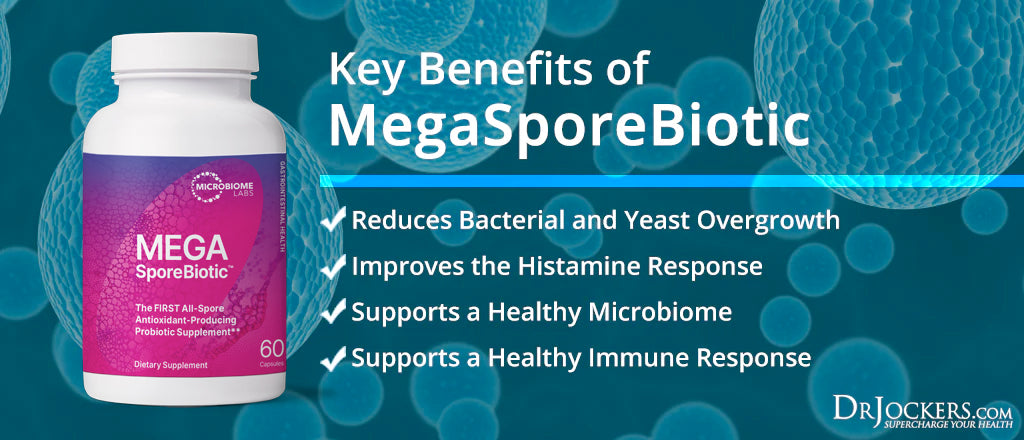






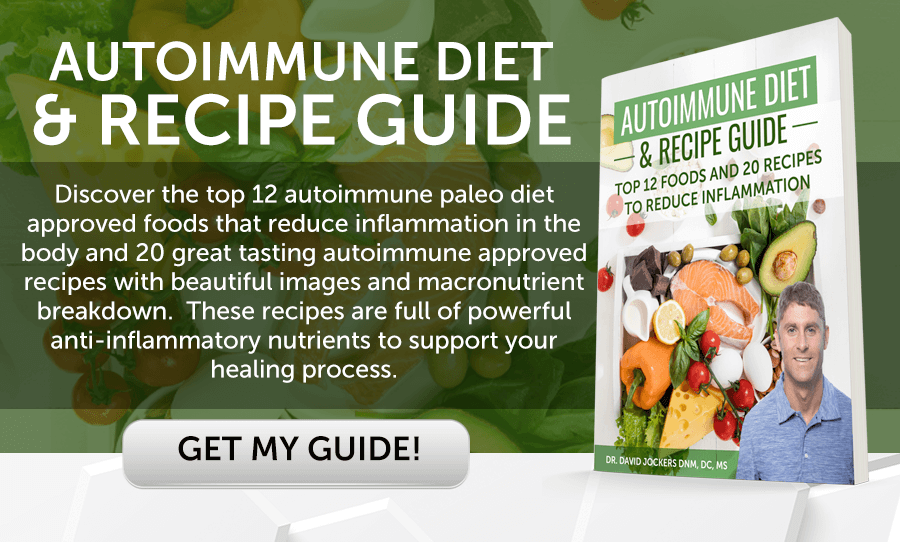


Is SBO Probiotic appropriate for someone with histamine intolerance since it contains prebiotic foods in a fermented botanical blend?
Hey Lore, Yes, SBO Probiotic can help!
Great article as usual. I thought I’d mention, BioGia helped my son with Methane, diarrhea in case anyone has that.
Thank you for sharing Alisa! Blessings!
Do you have supplements that could be helpful for 86 year old male who is also having
short term memory issues? Low energy and weakness but good blood tests. Almost too much information to absorb in short time. Thank you.
Sorry to hear this Ronald! I would recommend taking the Brain Supercharge right here and take 4 caps – 2x daily: https://store.drjockers.com/products/brain-supercharge-capsules
Dr Jockers, the article mentions to take Saccharomyces Boulardi while taking antibiotics, can it be taken after you have completed your antibiotics? Thank you!
Yes you can take it ongoing as well!
Hello,
Which is the best type of probiotic to take to keep Candida yeast at bay?
You mentioned a few types in your article and would appreciate clarification to fight Candida …
Ty.
Yes there are many that can be helpful. S Boulardii may have the most research behind it.